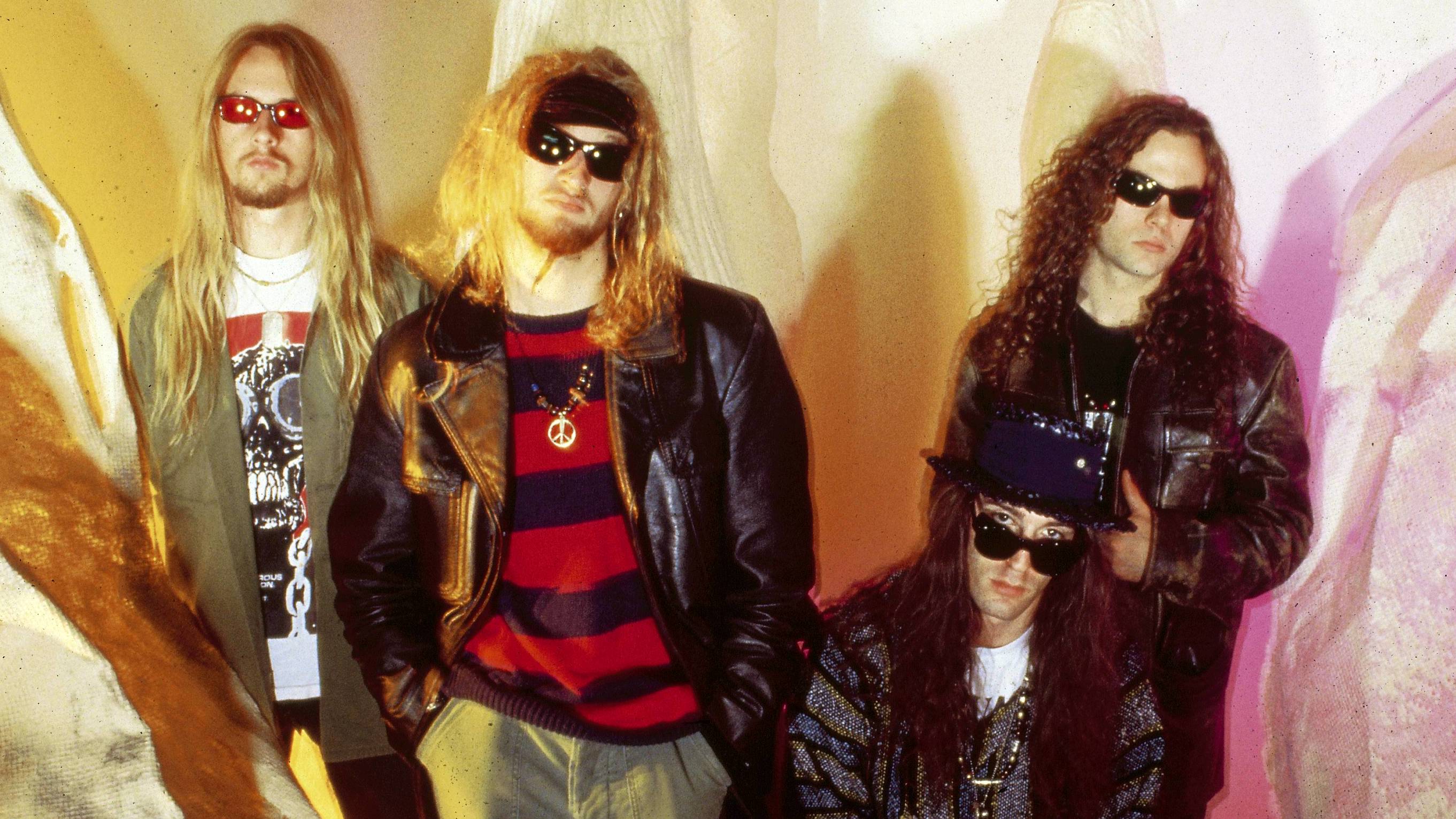Largely written out of the ‘official’ history of grunge, as their roots as a heavy metal band met with disapproval from the tastemakers at Sub Pop Records and their lackeys, Alice In Chains paved the way for the success of hipper peers Nirvana and Pearl Jam when their debut album Facelift racked up one million US sales ahead of the release of Nevermind and Ten.
Handicapped in the mid 1990s by their unswerving loyalty to troubled lead singer Layne Staley, Alice In Chains went on hiatus in 1996, and officially dissolved in April 2002 when 34-year-old Staley was found dead at home in Seattle. In 2008, the band were reborn with William DuVall taking on the frontman role: they’re currently working upon the follow-up to 2013’s The Devil Put Dinosaurs Here.
Here are their ten finest songs to date.
10. We Die Young (1990)
The song that introduced Alice In Chains to the world was written by guitarist Jerry Cantrell about gang violence after he observed 9 and 10 year old kids dealing drugs in Seattle. The title track of AIC’s debut EP, with a foot in both the alternative rock and heavy metal camps, We Die Young was later covered by Stone Sour on their 2015 EP Meanwhile In Burbank…
9. Black Gives Way To Blue (2009)
The haunting, bitter-sweet title track of AIC’s 2009 comeback album, written about Layne Staley, is notable for featuring a guest appearance from Elton John, who agreed to record piano on the track after receiving an email from Jerry Cantrell explaining the song’s significance. By curious coincidence, the first concert that Staley attended as a child was an Elton John gig.
8. Choke (2013)
On one level, the closing song from 2013’s excellent The Devil Put Dinosaurs Here can be read as a requiem for a broken relationship, but Jerry Cantrell’s thoughtful lyrics can also be read as a defiant kiss-off to critics who’ve dismissed AIC’s second act as less valid than their original work, not least when he sings “Go then, if you don’t feel right living in our home…”
7. No Excuses (1994)
Written and recorded in just one week in September 1993, when the band holed up in Seattle’s London Bridge studios after being evicted from their shared home, the Jar of Flies EP wasn’t conceived with an official release in mind, but rather as a way to integrate new bassist Mike Inez into the songwriting process. Nonetheless, No Excuses became an AIC standard, with Jerry Cantrell’s lyrics offering an insight into his frequently strained friendship with Staley.
6. Them Bones (1992)
The second single from AIC’s dark, powerful second album Dirt is Jerry Cantrell’s haunting reflection upon mortality: writing in the liner notes for 1999’s Music Bank box set, the guitarist admitted “The thought that all the beautiful things and knowledge and experiences you’ve been through just end when you end scares me, the thought that when you close your eyes for good, it’s gone forever.”
5. Man In The Box (1991)
The first ‘proper’ single lifted from the Facelift album, with its distinctive ‘talkbox’ guitar, down-tuned riff and doomy, portentous lyrics (’Jesus Christ, deny your maker’), Man In The Box sounded like nothing else around when it was first released to radio in 1990. Ironically, given its title, it was also the last song AIC ever played live with Layne Staley.
4. Got Me Wrong (1992)
Recorded as grunge was exploding worldwide, the largely acoustic Sap EP demonstrated that there was more to Alice In Chains than riffs and (bad) attitude. Written about Jerry Cantrell’s frustration with a girl he was dating, this low key but affecting song belatedly became a hit single for the quartet following its inclusion in the 1994 cult comedy Clerks.
3. Angry Chair (1992)
One of the few AIC songs credited solely to Layne Staley, the brooding, pitch-black Angry Chair, the second single lifted from the masterful Dirt album, offers a painfully stark portrait of the pain of addiction, with lyrics such as ‘Loneliness is not a phase/Field of pain is where I graze/Serenity is far away/Saw my reflection and cried.’ If Staley’s problems with drugs were an open secret in Seattle already, here they were laid out to the world in the most unflinching terms.
2. Rooster (1992)
A stunning highlight of the Dirt album, Rooster is Jerry Cantrell’s attempt to make sense of his relationship with his estranged father Jerry Cantrell Sr, referencing the psychological damage his father suffered as a soldier in the Vietnam war. “I certainly had resentments as any young person does in a situation where a parent isn’t around or a family is split,” the guitarist told Classic Rock in 2006.
“But on Rooster I was trying to think about his side of it – what he might have gone through.” When Cantrell Sr. first heard his son play the song he cried throughout, and it was a first step in healing the rift between the pair, leading the former war vet to appear in the song’s striking video.
1. Would?
An emotional high point on one of the greatest rock albums of the 1990s, the melancholic Would? was written by Jerry Cantrell in tribute to his friend Andrew Wood, the frontman of Mother Love Bone, who passed away following a heroin overdose in March 1990. First appearing as the opening track on the soundtrack for Cameron Crowe’s Singles, the song is perhaps the best illustration of the beautifully harmonised vocal interplay between Cantrell and Staley, which became an AIC trademark.

